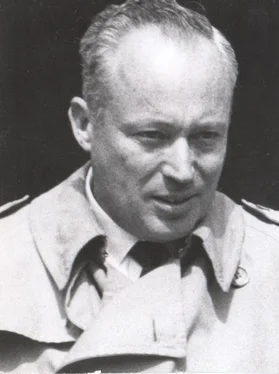Koenig set his pipe down. “Yes, Bronski, I have made peace with myself, if that is what you mean. You see, I have been lied to by all those philosophers of righteousness who speak of truth and beauty and the triumph of the lambs. This is real, here and now. It is a victory of lions. Germany has given me in one instant more than a thousand years of piddling through mediocrity and finding comfort in the quotations of false wisdoms.”
“Franz ...”
“Just a minute, Bronski. Your way puts me below your cunning. This way makes me your master. I take it you will serve on the Jewish Civil Authority.”
Paul laughed ironically. “Yes, I’ll be happy to.”
“Very well, then. Tomorrow at ten you will report here to receive your first instructions from the Kommissar, Rudolph Schreiker.”
Paul stood up slowly and extended his hand.
Koenig refused it. “It would be wise if you got into the habit of dispensing with amenities which heretofore made us appear as equals. You will address me as Dr. Koenig at all times and otherwise show the respect due a superior.”
“Times have changed,” Paul said. He started from the room.
“Bronski. One more thing. The Zoliborz suburb is being commandeered for the exclusive use of German officials and officers. Jews are no longer permitted. I shall be moving into your house in about ten days, so you have that length of time to resituate yourself. Before you start crying, I might say that out of deference to past relationships I will make a reasonable settlement on your property, a courtesy that most of the other Jews in Zoliborz will be denied.”
Bronski felt weak. He leaned against the door to support himself, then opened it quickly.
“Tomorrow, here at ten to meet Rudolph Schreiker.”
Chapter Two
Journal Entry
WARSAW HAS BLOSSOMED WITH German uniforms of all colors. One must have a program to tell who is über who. The biggest uniform apparently belongs to the new Kommissar, Rudolph Schreiker. We don’t know too much about him, but obviously he is not going to try to win a popularity contest here. The old Jewish Council, a quasi-religious government, has been disbanded. A new instrument called the Jewish Civil Authority has been formed. Emanuel Goldman, the musician and a good Zionist, asked me to serve on the executive board. I ducked him because this so-called Civil Authority doesn’t seem quite kosher to me.
ALEXANDER BRANDEL
Rudolph Schreiker, the new Kommissar of Warsaw, had come from a small town in Bavaria. He did not wish to spend his life at a cobbler’s bench as had his father, his grandfather, and his great-grandfather. It was doubtful that Rudolph would have made a good cobbler, anyhow, for he wasn’t very good at very much.
He reached maturity in that post-war Germany bitter over defeat, jobless, confused, floundering for direction. A malcontent in a time of malcontentment, he spent his energy berating a world he did not understand and was unable to cope with. Schreiker’s mediocrity left him with two divorces and four children and debts and alcoholic tantrums.
There were rumblings in Bavaria in the twenties which were music to Rudolph Schreiker and all of his breed. Obscure and insignificant people were being offered a status in life they could never have attained for themselves. His failures were explained to him in a way he liked to believe. He was not responsible for his plight but a victim of conspiracies by the world against his people. He became a Nazi at once.
This new status and this brown uniform and this striking insignia and this man who posed as the Christ of Germany did not demand that he earn his way through labor or through study or wisdom. If these had been demanded, then all the Schreikers would have remained anonymous and Nazism’s voice would not have sounded so jewel-toned, and that is why Nazism’s voice had such jewel-like tones to him.
All he had to do was exert brute force, the same kind of brute force he used in beating his wives. With little in the way of personality or mental capacity he was yet able to understand clearly that his only hope for success or recognition in the world lay in casting his lot with the Nazis.
He instinctively grasped the one basic rule: absolute obedience. In true German tradition he responded to discipline and power. As a drunkard and wife beater, he had demonstrated his absence of personal morality, so morality posed no problem.
All Rudolph Schreiker really wanted was to be somebody, and Adolf Hitler gave him that chance.
The Nazis took bullies and bums and made them heroes. In exchange, the bums gave absolute obedience. There was no qualm or remorse or inner conflicts of conscience when Schreiker was asked to destroy a synagogue or murder an enemy of the party.
And the Nazis did what Hitler promised. Germany became powerful and feared and, as it expanded, the loyal Schreikers were given their rewards. He had served un-questioningly for nearly two decades, and for this he was made the Kommissar of Warsaw in the General Government Area.
This was a large position for a man who had always been a deputy and whose greatest forte was following commands.
Certainly Schreiker was no mental giant and a great deal of the orders would come from Berlin or Krakow or Lublin, where his superiors held office. Nonetheless, it called for more administrative ability and more initiative and authority than he had ever believed he would possess. He did not want to fail. If he were a success in Warsaw, there might be no limit to how far he could advance.
Schreiker learned many lessons intuitively as a Nazi. One of the purest axioms was that intellectuals were weak men. They espoused noble ideas which he did not understand. They argued ideals, but they were not ready to die for them as he was for Nazism. These so-called thinkers were exactly opposite of what they posed to be. They were all talk. They were cowards.
He, Schreiker, could rule them because he could bully them. And they would not fight back. Moreover, he could use them to accomplish for him what he could not do for himself.
The moment he arrived in Warsaw he examined the lists of ethnics who had supported the Germans. Dr. Franz Koenig. Perfect. Middle-aged, physically inept, proven loyalty. A doctor and professor, highly educated, lover of classics, reader of philosophers. An intellectual who was completely controllable. Rudolph Schreiker gave Dr. Franz Koenig a uniform, a title, and nearly unlimited range and power in his operations.
A good little puppy dog who would help him rule his district.
Paul Bronski was led by Koenig through a series of connecting offices to that of the Kommissar of Warsaw. Rudolph Schreiker sat behind the desk. His personal vanity made him a striking figure. He was a large, strong man with square black German features. Franz Koenig took his place at Schreiker’s right.
“They are all here,” Koenig said.
Paul Bronski recognized the other men. Silberberg, the playwright. There was Marinski, who controlled most of the leather factories around lower Gensia Street, and Schoenfeld, the most brilliant of Warsaw’s Jewish lawyers and a former member of the Polish Parliament. Seidman, an engineer, was there and Colonel Weiss, one of the highest-ranking Jews of the Polish army. Goldman, an outstanding musician who had at one time taught both Deborah and Rachael. He was known as a strong Zionist among the intellectuals. Finally, there was Boris Presser. Presser seemed out of place in an otherwise distinguished gathering. He was a merchant, the owner of a large department store, but completely unnoted politically or socially in Warsaw.
The eight of them fidgeted before Schreiker’s desk. The Kommissar looked from one to the other slowly, examining each and playing the game of invoking his power and authority by deliberate mannerism.
Читать дальше












